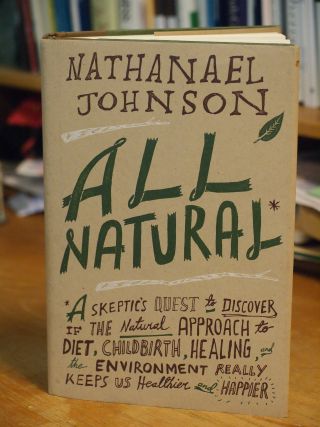Environment
Is Natural Better?
Reassessing what's best in food, healing, and living in the big outdoors.
Posted April 8, 2013

Nathanael Johnson is an award-winning journalist who returned to his hippie all-natural growing-up years to take a fresh and serious look at what was right about his parents' religion of natural ... and to shine a bright light as well on where natural practices in reality lead to less health and happiness versus to marital problems and divorce. Especially when it comes to intimate relationships and marriage, as I wrote in an earlier post, "doing what comes naturally" can be a really bad idea.
As someone who often feels that natural is right and yet often chooses non-natural options, I loved reading this engaging and informative book, so much so that I've decided to exerpt for my PT readers at least a few of the many insightful gems.
Johnson's book, All Natural, debunks myths about birth, both natural and physician-assisted. He focuses on food with equal treatment to the dangers of excessive vegetable eating and of excessive food-processing. He explores vaccines, ointments with toxic lavender, milk, microbes, environmentalism, agriculture and more with stories about scientific research that read like detective mysteries.
Here's a sampling of some of my favorite passages:
(p. 302) Leave the city...and the right hemisphere has a chance to breathe. Anyone who moves between a built and naural environment will recognize a certain relaxation, a melting away of problems that had previously seemed all-important, as they step out into the wilderness. ...
(p.303) Real estate prices reveal that buyers are willing to spend thousands of dollars more for environments (or simply views) that include water, trees, or vegetation. In Portland, women living in neighborhoods with lots of trees were less likely to have low-birth-weight babies, even after controlling for their economic status. A famous study of gallbladder-surgery patients found that those whose windows faced a brick wall took longer to recover than those with windows opening onto leafy foliage...
(p. 304) ... I was perched high on a slope, with a view of Danali National Park...I'd hitchhiked from Anchorage that day, and for dinner I'd eaten a little cornmeal and two firm spears of salmon ... As I looked out on the Alaskan splendor, instead of experiencing fulfillment, the feeling that engulfed me was one of crushing isolation. I began bargaining with myself: I would trade this view--along with the roll of bills in the side-pocket of my backpaack and my left pinky toe if necessary--for one night spent playing poker with a few raft guides in a grungy boathouse....."HAPPINESS ONLY REAL WHEN SHARED."
It wasn't the Yosemite sunsets that had filled me with such hale energy as a child, it was watching those sunsets with my family, the four of us huddled together, windbreaker against windbreaker. It wasn't the close clarity of the stars but Mom pointing out the Milky Way .... It was not only the place that mattered, but the fact that in that place the family was together and uninterrupted. I'd gone looking for Eden in the places where human fingerprints disappeared, but paradise was empty without the human touch....
(p. 296) In the process of writing this book, friends would often ask me whether I was siding with nature or technology. At first I'd say that it was complex, sometimes one was right, sometimes the other ...That's true ..., but in a larger sense, both are right. Nature is deadly and nurturing...
(p. 298) Despite it's faults, the narrow technological perspective is an essential tool. It gives us control. I want obstetricians innovating to make C-sections safer ...
On a personal note
I end with this quote about obstetricians because my own earlier penchants for "all natural" were profoundly tempered by the process of giving birth and raising children.
I was all for natural childbirth, until birthing my first child. After three days of labor, either baby and I both would die or I needed to let the medical technicians give me a full-court-press: labor-intensifying hormones, anaesthesia, and forceps.
Similarly, I had been dedicated to pure breast feeding for the first months of my beautiful new baby's life, until I realized that my milk was drying up. Feeding her bottles with formula would be the only option for sustaining her.
So may nature and all that is natural enrich our lives...and technology continue to enable us to build strong homes to protect us from nature's extremes, give us heat and cooling options, and provide big windows from which we can comfortably look out on nature's storms. From the safety of our man-built living rooms we can enjoy the beauty of wind and snow, thunder and lightening, sipping hot chocolate packaged by the food-industrial complex. We can enjoy outdoors from indoors, lovers by our side, friends nearby, children on our laps, and love in our hearts ...
...
Susan Heitler, Ph.D., a graduate of Harvard and NYU, is a clinical psychologist in Denver who specializes in helping couples to build strong relationships and families. Her book for therapists, From Conflict to Resolution, and her Power of Two book, workbook and interactive website for couples teach the skills for personal and relationship success.




